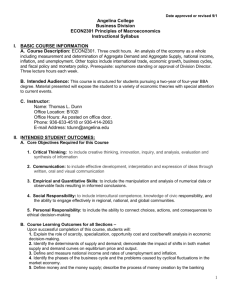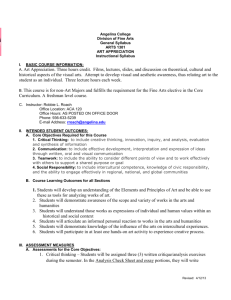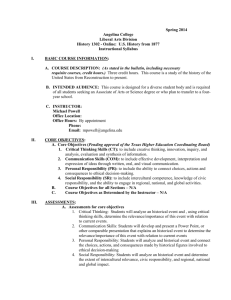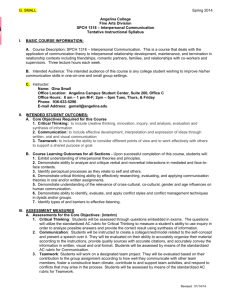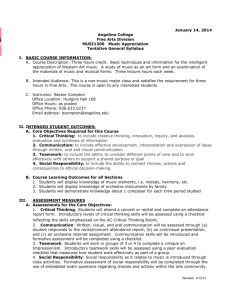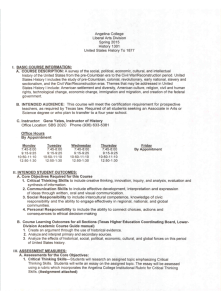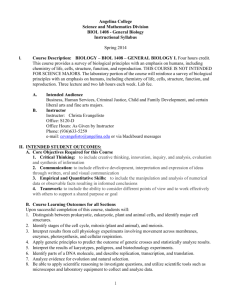Syllabus
advertisement
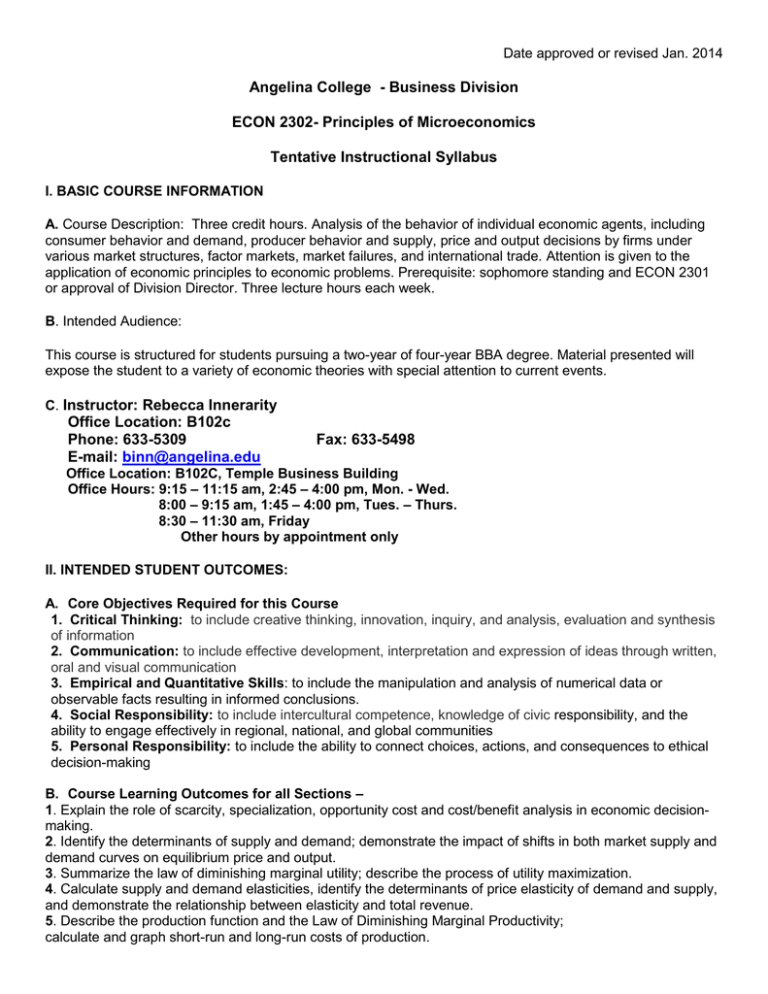
Date approved or revised Jan. 2014 Angelina College - Business Division ECON 2302- Principles of Microeconomics Tentative Instructional Syllabus I. BASIC COURSE INFORMATION A. Course Description: Three credit hours. Analysis of the behavior of individual economic agents, including consumer behavior and demand, producer behavior and supply, price and output decisions by firms under various market structures, factor markets, market failures, and international trade. Attention is given to the application of economic principles to economic problems. Prerequisite: sophomore standing and ECON 2301 or approval of Division Director. Three lecture hours each week. B. Intended Audience: This course is structured for students pursuing a two-year of four-year BBA degree. Material presented will expose the student to a variety of economic theories with special attention to current events. C. Instructor: Rebecca Innerarity Office Location: B102c Phone: 633-5309 E-mail: binn@angelina.edu Fax: 633-5498 Office Location: B102C, Temple Business Building Office Hours: 9:15 – 11:15 am, 2:45 – 4:00 pm, Mon. - Wed. 8:00 – 9:15 am, 1:45 – 4:00 pm, Tues. – Thurs. 8:30 – 11:30 am, Friday Other hours by appointment only II. INTENDED STUDENT OUTCOMES: A. Core Objectives Required for this Course 1. Critical Thinking: to include creative thinking, innovation, inquiry, and analysis, evaluation and synthesis of information 2. Communication: to include effective development, interpretation and expression of ideas through written, oral and visual communication 3. Empirical and Quantitative Skills: to include the manipulation and analysis of numerical data or observable facts resulting in informed conclusions. 4. Social Responsibility: to include intercultural competence, knowledge of civic responsibility, and the ability to engage effectively in regional, national, and global communities 5. Personal Responsibility: to include the ability to connect choices, actions, and consequences to ethical decision-making B. Course Learning Outcomes for all Sections – 1. Explain the role of scarcity, specialization, opportunity cost and cost/benefit analysis in economic decisionmaking. 2. Identify the determinants of supply and demand; demonstrate the impact of shifts in both market supply and demand curves on equilibrium price and output. 3. Summarize the law of diminishing marginal utility; describe the process of utility maximization. 4. Calculate supply and demand elasticities, identify the determinants of price elasticity of demand and supply, and demonstrate the relationship between elasticity and total revenue. 5. Describe the production function and the Law of Diminishing Marginal Productivity; calculate and graph short-run and long-run costs of production. 6. Identify the four market structures by characteristics; calculate and graph the profit maximizing price and quantity in the output markets by use of marginal analysis. 7. Determine the profit maximizing price and quantity of resources in factor markets under perfect and imperfect competition by use of marginal analysis. 8. Describe governmental efforts to address market failure such as monopoly power, externalities, and public goods. 9. Identify the benefits of free trade using the concept of comparative advantage. 10. Be aware of and continue their interest in major economic problems in society. 11. Develop a firm grasp of the few basic principles and the analytical tools they need in order to think critically and intelligently about economic problems. 12. Develop the language and vocabulary of economics. 13. Develop good methods in thinking about economic problems. 14. Obtain skills in thorough, exact reading and in careful, concise written and oral expression. III. ASSESSMENT MEASURES A. Assessments for the Core Objectives 1. Critical Thinking: Critical thinking is acquired through inquiry, analysis, evaluation, and synthesis of information. Students develop this skill in order to understand and apply economic models and theories. Critical thinking skills are demonstrated through imbedded questions on exams, quizzes, and assigned homework problems. The rubric developed by Angelina College will be used in assessing student performance. 2. Communication: Students develop a working vocabulary of economic terms in order to communicate economic conclusions and theories. Students display communications skills on exams and homework (written) through a series of questions and in interactive class discussion (oral). The rubric developed by Angelina College will be used in assessing student performance. 3. Empirical and Quantitative Skills: Economic concepts presented in empirical and quantitative studies help students understand real world problems, such as marginal analysis, national income accounting, unemployment, inflation, and real gross domestic product. Students will display their use of empirical and quantitative skills in written exam questions and homework questions/problems assigned. The rubric developed by Angelina College will be used in assessing student performance. 4. Social Responsibility: Students learn how to apply economic models to specific economic questions presented and how their decisions help distribute scarce resources in a market-driven economy. Imbedded exam questions and quiz/homework assignments demonstrate their understanding of social responsibility as it relates to economic issues. The rubric developed by Angelina College will be used in assessing student performance. 5. Personal Responsibility: As students become more aware of their responsibility as a citizen and participant in a market economy, they make better decisions, blending cost-benefit analysis and social responsibility in everyday life. The student acquires a deeper understanding of how their ethical choices, actions, and consequences of those actions affect their workplace, family, and community in which they live. Personal responsibility is accessed through student demonstrations in in-class participation, homework assignments, and exam problem questions. The rubric developed by Angelina College will be used in assessing student performance. B. Assessments for Core Learning Outcomes Rubrics developed by Angelina College for the core objectives: Communication, Critical Thinking, Empirical and Quantitative Skills, Social Responsibility, and Personal Responsibility will be used during assessment of these objectives: 1. Students will demonstrate their knowledge of the role of scarcity, specialization, opportunity cost and cost/benefit analysis through a series of homework/quiz/exam questions. 2. Students will demonstrate their knowledge of the determinants of supply and demand; demonstrate the impact of shifts in both market supply and demand curves on equilibrium price and output by answering questions in a quiz or exam format. 3. Students will demonstrate their knowledge of demand, supply and price elasticity through a series of questions on chapter quizzes or major exams. 4. Students will demonstrate their knowledge of production costs and price maximization/loss minimization caused by price changes in the market economy through exam and quiz questions. 5. Students will identify the four Market structures and know their characteristics through answering homework/quiz/exam questions 6. Students will develop their skill in using comparative advantage and absolute advantage in comparing two product economics through a series of questions on homework assignments or exam. 7. Students will recognize market failures and the role of public goods in our economy by answering questions in homework assignments or exams. IV. INSTRUCTIONAL PROCEDURES: Methodologies common to all sections - Methodologies utilized in presenting course content may include lectures, audio-visual presentations, discussions, examinations, student presentations, field trips, or guest speakers. For the traditional classroom course, teaching approaches are expected to vary with individual instructors who should employ those techniques which work best for them and their students. Although lecture and reading assignments are the primary delivery systems, other instructional techniques may include classroom discussion, on-line delivery (Blackboard) audio-visual presentations, speakers, physical demonstration of concepts, critical thinking exercises, and group activities. V. COURSE REQUIREMENTS AND POLICIES: A. Required Textbooks, Materials, and Equipment – Economics, McConnell and Brue, 19th Edition, McGraw Hill ISBN #978-0-07-351144-3; notebook or paper, pencil or pen, calculator, and graph paper B. Course Policies – (This course conforms to the policies of Angelina College as stated in the Angelina College Handbook.) Academic Assistance – If you have a disability (as cited in Section 504 of the Rehabilitation Act of 1973 or Title II of the Americans with Disabilities Act of 1990) that may affect your participation in this class, you should see Karen Bowser, Room 208 of the Student Center. At a post-secondary institution, you must self-identify as a person with a disability; Ms. Bowser will assist you with the necessary information to do so. To report any complaints of discrimination related to disability, you should contact Dr. Patricia McKenzie, Administration Building, Room 105 or 936-633-5201. Discrimination – Angelina College admits students without regard for race, color, creed, sex, national origin, age, religion, or disability. Inquiries concerning sex equality, disability, or age should be directed to Dr. Patricia McKenzie (936) 633-5201, Angelina College Administration Building, Room A105. Attendance – ATTEND the CLASS whether is it in a face-to-face, traditional classroom setting or through online participation (logging into and completing the activities, i.e. Discussion, Assignment, Assessment). The course material is cumulative and homework assignments must be completed sequentially in order for the student to derive the greatest benefit from the course. Students must attend all classes. With respect to official school functions and religious holidays, the Angelina College Catalog and Student Handbook policies will be followed. Student Conduct – An environment conducive to learning will be appreciated. Being courteous and respectful toward others in class as well as to the instructor will create a positive atmosphere. During lectures, refrain from eating, drinking, sleeping, or engaging in distracting conversation. According to Angelina College policy, cheating and/or plagiarism will not be tolerated. Official class withdrawal forms must be turned in. Instructor may drop you from this class for non-attendance in accordance with AC attendance policies outlined in the General Bulletin. Additional Policies Established by the Individual Instructor - Mid-term is March 21. The last day to drop this course with a “W” is April 7. Incompletes (I) are not given unless approved by the instructor and are subject to approval by the Dean of Instruction. Failure to appropriately withdraw/drop a course (except as stated above) may result in a final grade of “F”. It is the student’s responsibility to initiate any drop or withdrawal forms. WP and WF grades are no longer given by A.C. Food, drinks, and tobacco products are not permitted in the classroom. Students may not bring children to class. Bringing your children to class impedes classroom instruction, and may be a distraction to you and your fellow classmates. All cell phones must be turned off during class unless required by employer, physician, etc., and documentation of necessity must be provided to instructor. If the student has made previous arrangements with the instructor, they may set the phone to vibrate once, leave room, and may not disturb class by talking on phone. If you feel that you need a tutor, contact the Student Services Office. Also, if you as a student have special learning needs which should be accommodated by Angelina College, please contact the Student Services Office. VI. COURSE OUTLINE – Description of the Course Activities, Including due dates, schedules, and deadlines. DISCUSSIONS/ACTIVITIES – See On-line Calendar DATE VII. EVALUATION AND GRADING: A. Grading Criteria (percents, extra credit, etc.) Three or four major examinations including a comprehensive final will be given during the semester and each test will be worth 100 points. These exam scores will be averaged and are worth 70% of the total grade. There will be no make-up for the final exam. Quizzes, other in-class assignments, or homework assignments are averaged and worth 30% of the student's total grade. Make-up exam - If you miss an exam (not recommended), and the reason for missing the exam is excused (as determined by the instructor), then a make-up must be taken at a special time and day as determined by the instructor. Only one exam can be re-taken. There is no make-up exam for the final exam. B. Determination of Grade (assignment of letter grades) A ten-point grading system will be utilized as follows: 90-100 A 80-89 B 70-79 C 60-69 D Below 60 F The instructor may modify the provisions of the syllabus to meet individual class needs by informing the class in advance as to the changes being made.
